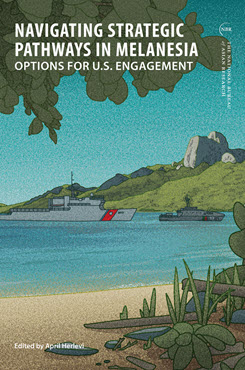Essay in NBR Special Report 110
The Role of the Melanesian Spearhead Group in Security Cooperation
This essay examines the evolution of the Melanesian Spearhead Group (MSG), member countries’ ambitions for economic growth and development, and the re-emergence of security as the main priority for the MSG.
EXECUTIVE SUMMARY
MAIN ARGUMENT
The MSG was formed in 1986 at the height of the decolonization movements in the Pacific Islands region. During that period, internal challenges relating to security and colonial administration led to decolonization and successful security cooperation. Following independence, there was an urgent need for economic development. Trade was considered a potential vehicle for economic growth, and by 1993 the Melanesian Spearhead Group Trade Agreement was concluded and signed by MSG members. This led to steady growth in trade until mid-2000, when the region was confronted with numerous security challenges. As a result, security cooperation re-emerged as a top priority for national and regional cooperation. In each evolution of MSG cooperation, different sets of circumstances, challenges, and opportunities called forth a need for subregional institutional development and growth, and the MSG played a part in fulfilling those needs. In view of the current and likely future trajectories of subregionalism and other broad, overarching challenges, the MSG is poised to provide opportunities for broadening security and peace in the region.
POLICY IMPLICATIONS
- MSG security cooperation is driven largely by internal needs, challenges, and opportunities. Thus, the MSG tends to be more responsive to partnerships that respect local uniqueness and partners that address national needs than to those that prioritize global interests in the region.
- Melanesian customs play an important role in MSG diplomacy and are a powerful unifying force of shared identity and purpose among members. The key to effective partnerships for international actors seeking to engage successfully with the MSG is a deeper understanding of Melanesian customs and diplomacy.
- The growing influence of MSG subregionalism in the Pacific is due to the group’s ability to provide a platform that advocates for the needs and development agendas of its members and redefines homegrown solutions to security challenges.
- The MSG cooperation and security architecture is premised on addressing national security, alleviating poverty, encouraging economic development, and strengthening state institutions.
Ilan Kiloe is Programme Manager for the Political, Security and Legal Affairs Programme at the Melanesian Spearhead Group.


